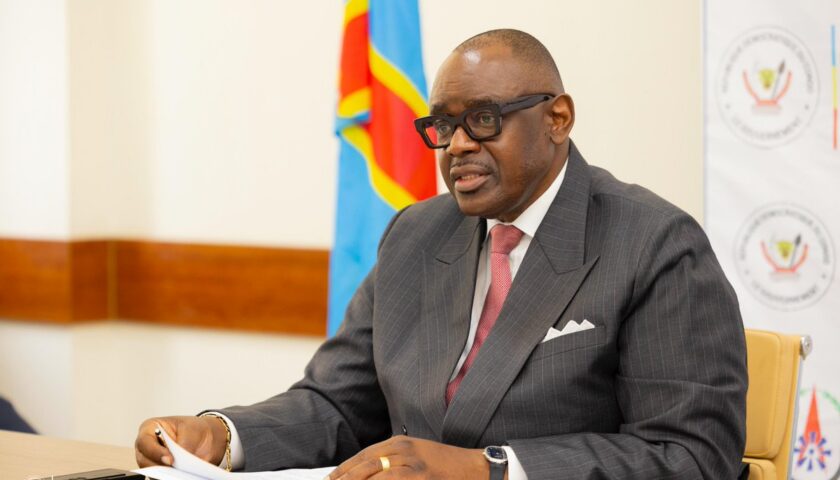Mark Bristow (Metalsnews.com Pic)
LONDON (Mineweb) –
In its 2012 annual report, Randgold Resources confirms it is looking at jvs with cash-strapped developers and explorers.
Randgold Resources is one of two mid-tier gold miners quoted on the London stock Exchange main board making announcements today – the other is Petropavlovsk – and CEO Mark Bristow was able to give another upbeat assessment as the company releases its 2012 Annual Report.
What is indeed encouraging about Randgold’s latest reserve and resource update is that despite record gold production last year, the company still managed to increase its attributable reserves – and at a higher overall grade. The new figures show total attributable mineral reserves up by 803,000 ounces to 16.36 million ounces, while overall reserve grade increased from 3.84 to 3.87g/t. Talking resources, as opposed to the better quality reserve figures, total attributable resources fell marginally from 28.25 to 27.21 million ounces, but much of this fall will have been from conversion of resources to the better reserve category. Reserves were calculated at a relatively conservative $1,000 an ounce, while resources were assessed at the higher figure of $1500 an ounce.
Bristow, commenting on the figures, noted that while the gold mining industry in general was decreasing the grade at which it mined in order to maintain production profiles, and thus intensifying cost pressures, Randgold was able to replace its depleted ounces at a higher grade.
He also commented on the company’s exploration ability and successes, but also said that the heavily reduced valuations and financial difficulties affecting the junior exploration sector are opening the way to negotiating promising joint venture opportunities with junior explorers operating in its core West and Central African region, “We’re also looking to expand our footprint there through joint ventures with junior exploration companies, some of whom hold good assets but are unable to develop them in a stressed market,” he said.
Writing in the company’s annual report, Bristow says the company’s top priority is to deliver on its promise to pour first gold at the giant Kibali gold mine project in the Democratic Republic of Congo before the end of 2013. Randgold is the operator controlling 45% with AngloGold Ashanti also owning 45% and the balance held by state-owned mining company OKIMO. Other focus areas include ramping up production at its flagship Loulo-Gounkoto complex in Mali and completing a feasibility study on a new underground mine at Gounkoto.
Despite capital expenditure of US$562.3 million last year, mainly on Kibali, Randgold’s cash and gold on hand at the end of 2012 totalled US$403 million, which means the company is well placed to fund its future growth, Bristow says.
Also in the report, chairman Philippe Liétard notes that its partnership with local government philosophy is an integral part of everything Randgold does. “Over the past year it again showed its merit by cushioning the company against the upheavals in Mali, providing a supportive environment for its operations and helping Kibali to advance rapidly. Like all close relationships, Randgold’s partnerships with its host governments are occasionally strained but these moments are invariably overcome when the overriding considerations of common interests and shared values reassert themselves,” he says.
On this subject, Bristow noted further that “We also intend to continue to work with the governments of our host countries, guided by our partnership philosophy, to head off short-sighted changes to their mining codes.”
Randgold has been one of the gold sector’s success stories of the past decade. While everything has not always gone smoothly politically or technologically, the company has proved to be very adept at overcoming any problems that have arisen to date and provided continually growing gold output at reasonable operating costs in an area of the world which cannot be easy to mine in. The company has had major successes in building its own projects in Mali into highly profitable and productive gold mining operations, has perhaps been less successful so far in its Tongon mine in Cote d’Ivoire, although is confident it has largely overcome its problems there, and is now very reliant on its Kibali mega project in the DRC for much of its growth going forward. It has managed to remain on track, despite political upheavals in Mali and Cote d’Ivoire, recording hardly a blip as a result of these. It is now hoping to be similarly successful in the potential political minefield of the DRC, but is also looking to further developments back in its main West African stamping ground. It has a good track record of dealing with African governments to date and that, undoubtedly, is why AngloGold ceded the Kibali project operational management to the smaller company. Bristow and his team have a good following – and deservedly so.




